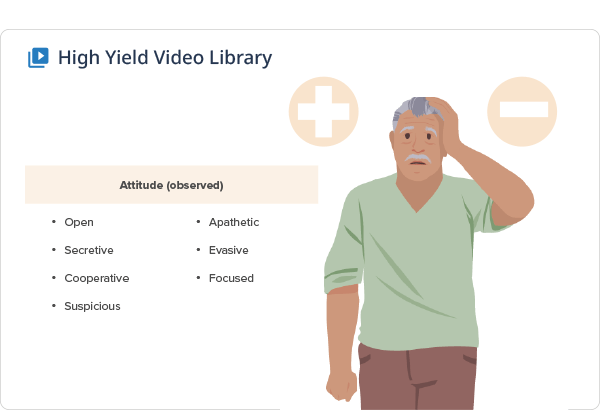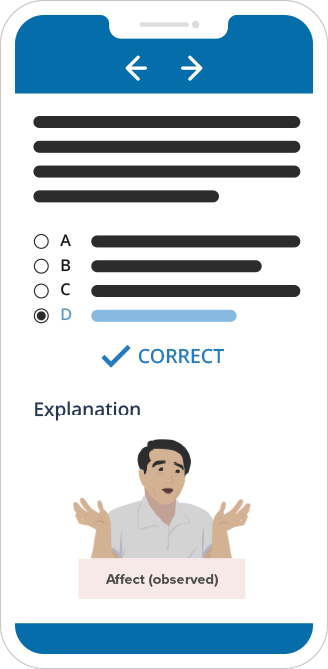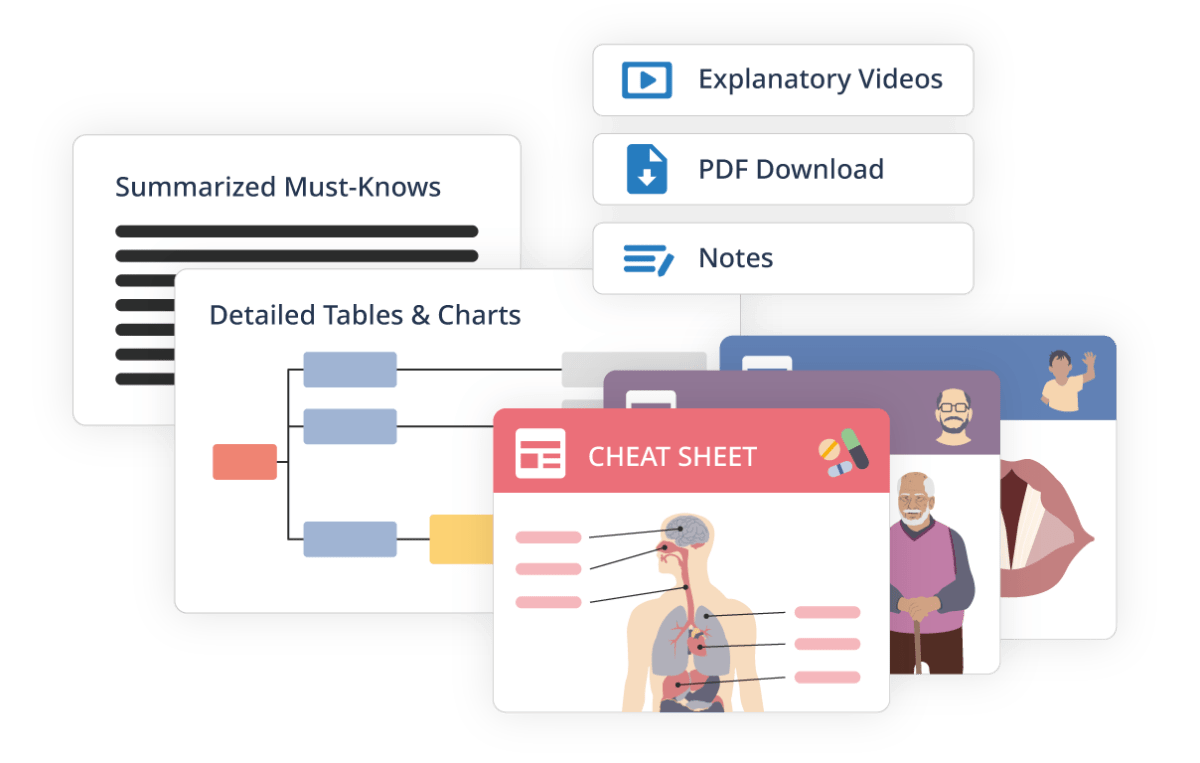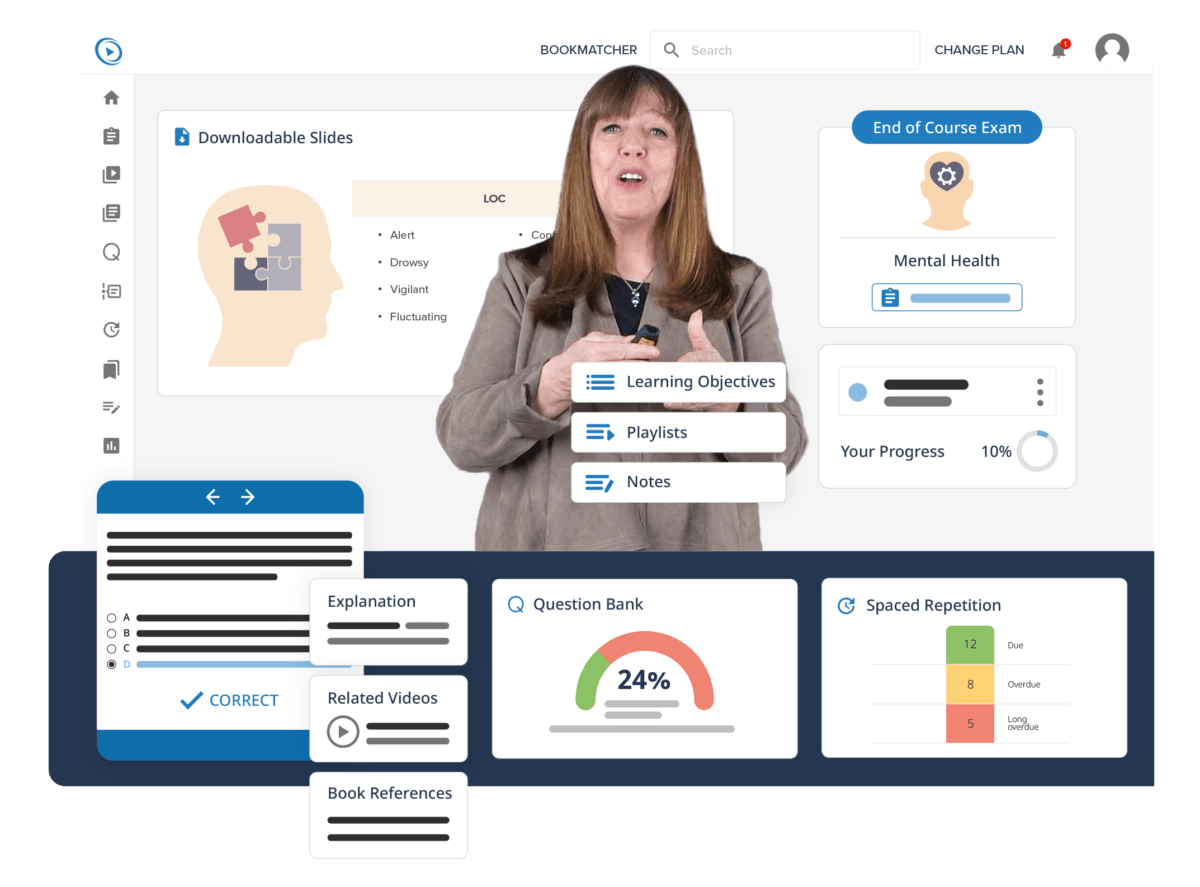Lecturio's
All-in-one Online Mental Health Nursing Course
Ace your nursing exams with a smart, expert-built learning platform.




Start the online mental health nursing course taught by Prof. Brenda Marshall
This course leads you through the mental health topics likely to be tested on the NCLEX® exam, where mental health encompasses approximately 9% of the questions. Explore the concepts of mental health throughout the various growth and development stages of life that result in a therapeutic patient environment by watching high-yield video lessons, practicing with NCLEX®-style review questions, and studying with downloadable lecture notes and cheat sheets.

Share this mental health course:

Expert-made mental health nursing cheat sheets help you learn faster and score higher.
Studying for mental health nursing can be challenging. Our concise, downloadable cheat sheets help you retain the must-know points about complex nursing concepts reliably and efficiently. Download them, print them, take notes on them – and confidently walk into your exams and clinicals.
Close your heavy textbooks and learn at your own pace
And that’s not all. With Lecturio, you can apply your mental health knowledge by answering real exam practice questions that will help you retain everything you learned using quizzes.
185+ Mental Health Video Lessons
Short and concise video lessons offer downloadable slides and multilingual subtitles.
220+ Mental Health Exam Practice Questions
Our exam-simulating interface is designed to help you familiarize yourself with actual mental health test situations.
535+ Questions for Better Recall
Our adaptive learning algorithm uses smart Spaced-Repetition quizzes to help you retain mental health nursing information over the long term.


Lecturio’s Mental Health Course covers all relevant topics
for nursing students
This top educator teaches you everything you need to know about mental health nursing

Dr. Brenda Marshall is a Professor of Nursing at William Paterson University in Wayne, New Jersey, where she is also the director of the Center for Research in the College of Science and Health. She is a board-certified psychiatric nurse practitioner and a specialist in mental health, trauma and substance use disorders, running her own private practice in Oakland, NJ. Dr. Marshall received her Bachelor’s degree from Eisenhower College, holds several Master’s degrees and got her Doctor of education (EdD) from Teachers College, Columbia University. Furthermore, she is a Fulbright Scholar Specialist in Mental Health and a Fellow of the American Association of Nurse Practitioners (FAANP). Dr. Marshall is also an author of several publications, as well as peer reviewed journal articles.
Lecturio Nursing Premium – Get ready to become licensed
Unwrap New Skills This Holiday
Get 50% off all Premium plans
First 7 Days Free
Get 50% off all Premium plans - First 7 days free
First 7 Days Free
Get 50% off all Premium plans - First 7 days free
Recommended by NCLEX® instructors. Trusted by thousands of users.
1 Month
/month
- Full Video Library access
- Full Qbank access
- Exam-focused Learning Paths (including NGN)
- Next Gen NCLEX-RN® Practice Exams
3 Months
/month
- Full Video Library access
- Full Qbank access
- Exam-focused Learning Paths (including NGN)
- Next Gen NCLEX-RN® Practice Exams
Most Popular
12 Months
/month
- Full Video Library access
- Full Qbank access
- Exam-focused Learning Paths (including NGN)
- Next Gen NCLEX-RN® Practice Exams
1 Month
/month
1AUD,CAD,EUR,GBP,USD,INR,MXN 39.99,39.99,29.99,29.99,29.99,1499,399 charged every month
- Full Video Library access
- Full Qbank access
- Exam-focused Learning Paths (including NGN)
- Next Gen NCLEX-RN® Practice Exams
Get full access today. Pay after 7 days. Cancel anytime.
3 Months
/month
1AUD,CAD,EUR,GBP,USD,INR,MXN 104.97,104.97,74.97,74.97,74.97,4197,1047 charged every 3 months
- Full Video Library access
- Full Qbank access
- Exam-focused Learning Paths (including NGN)
- Next Gen NCLEX-RN® Practice Exams
Get full access today. Pay after 7 days. Cancel anytime.
Most Popular
12 Months
/month
1AUD,CAD,EUR,GBP,USD,INR,MXN 359.88,359.88,239.88,239.88,239.88,15588,3588 charged every 12 months
- Full Video Library access
- Full Qbank access
- Exam-focused Learning Paths (including NGN)
- Next Gen NCLEX-RN® Practice Exams
Get full access today. Pay after 7 days. Cancel anytime.
1 Month
/month
1AUD,CAD,EUR,GBP,USD,INR,MXN 39.99,39.99,29.99,29.99,29.99,1499,399 charged every month
- Full Video Library access
- Full Qbank access
- Exam-focused Learning Paths (including NGN)
- Next Gen NCLEX-RN® Practice Exams
Get full access today. Pay after 7 days. Cancel anytime.
3 Months
/month
1AUD,CAD,EUR,GBP,USD,INR,MXN 104.97,104.97,74.97,74.97,74.97,4197,1047 charged every 3 months
- Full Video Library access
- Full Qbank access
- Exam-focused Learning Paths (including NGN)
- Next Gen NCLEX-RN® Practice Exams
Get full access today. Pay after 7 days. Cancel anytime.
Most Popular
12 Months
/month
1AUD,CAD,EUR,GBP,USD,INR,MXN 359.88,359.88,239.88,239.88,239.88,15588,3588 charged every 12 months
- Full Video Library access
- Full Qbank access
- Exam-focused Learning Paths (including NGN)
- Next Gen NCLEX-RN® Practice Exams
Get full access today. Pay after 7 days. Cancel anytime.
Want to learn even more?
Explore the tailor-made curriculum for RNs, LPNs, and other nursing students
- Nursing School Survival Guide (RN)
- Nursing School Survival Guide (LPN)
- Anatomy
- Clinical Ethics
- Clinical Skills
- Critical Care
- Diversity, Equity, Inclusion, and Belonging
- Dosage Calculation Nursing
- Fundamentals of Nursing: Theory
- Gerontology Nursing
- Leadership
- Maternity Nursing and Care of the Childbearing Family
- Medical–Surgical Nursing & Pathophysiology
- Mental Health Nursing
- Nursing Prerequisites
- Pediatrics Nursing
- Pharmacology Nursing
- Physical Assessment for Nursing
- Physiology Nursing
- Public Health
- Study Skills: Learn how to Study Nursing
Free Nursing Cheat Sheets
Create your free Lecturio account now to download all cheat sheets – 100% risk free, no credit card needed.
No results found.
FAQs
What is mental health nursing?
Mental health nursing is also known as psychiatric nursing and is a special field of nursing practice. This involves the care of individuals with a mental health disorder. As a mental health nurse, you need advanced knowledge of the assessment, diagnosis, and treatment of psychiatric disorders.
What does a mental health nurse do?
The primary role of a mental health nurse is to provide care to patients with a psychiatric disorder. These are some areas of responsibility in detail:
Assessment and evaluation of the patient’s mental health
Support and education of the patients and their family
Development of treatment care plan
How do you become a mental health nurse?
To become a mental health nurse, you first need to be a registered nurse (RN) by earning a diploma, associate degree or Bachelor of Science in Nursing (BSN) degree from an accredited nursing program. After that, you have to gain experience working as an RN. Through this clinical experience you have the opportunity to apply and expand your theoretical knowledge in practice. If you want to be a psychiatric mental health nurse practitioner (PMHNP), you can pursue an advanced degree.
Is mental health nursing hard?
Mental health nursing is tough because caring for mentally ill patients can be emotionally draining. Also, the stress level of a mental health nurse is very high. The job is also demanding because there is an immense amount of medication and side effects that you have to know.
What skills do you need to become a mental health nurse?
PMHNPs and mental health nurses should be able to:
Understand a patient’s medical and psychiatric history
Assess a patient’s symptoms and causes & track progress
Demonstrate empathy for patients and help patients cope with chronic issues
Administer/monitor medication
Exhibit patience with those who struggle to recover
Provide counseling to patients and their families
Do mental health nurses give injections?
Mental health nurses are allowed to give injections.
What is the difference between mental health nursing and general nursing?
A general nurse takes care of everything around physical illness. On the other hand, a mental health nurse takes care of everything that has to do with mental illness. It’s hard to compare the two because, while both could be categorized as being in health care, they each require very different skills.
Why should I be a mental health nurse?
There are a lot of reasons why you should become a mental health nurse, for example:
For a personal reward because you are able to help people in need
The demand is greater than ever and related with that there is a high earning potential.